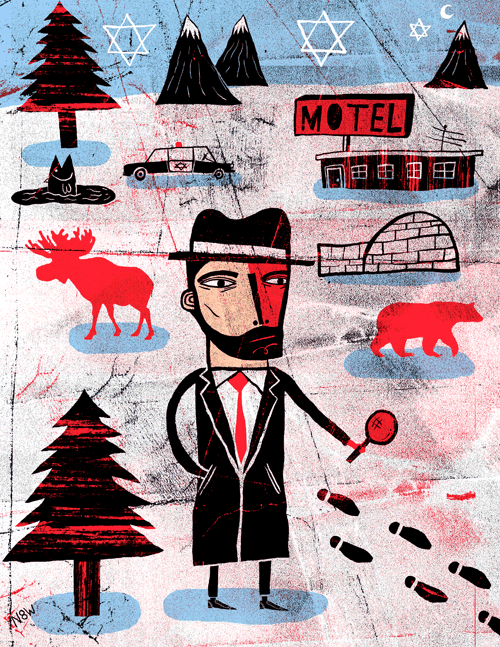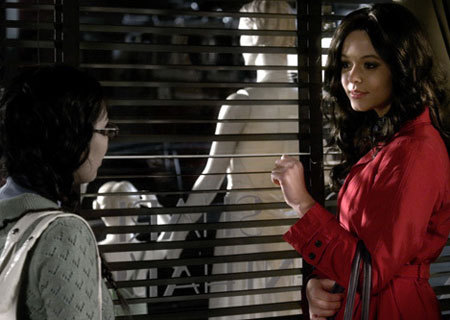Vivian Darkbloom in Pretty Little Liars
"Very few people know Vivian's true identity," says the Pretty Little Liars wiki.
Vladimir Nabokov's anagram, Vivian Darkbloom, has appeared in Ada and Lolita (and in the Acknowledgments page of Arthur Philips's The Egyptologist). She now also appears in the ABC Family series Pretty Little Liars, where Vivian is the alter-ego of Alison DiLaurentis.
Thanks to the Nabokv-L Listserv and to Jansy Mello for the tip.
Vladimir Nabokov's anagram, Vivian Darkbloom, has appeared in Ada and Lolita (and in the Acknowledgments page of Arthur Philips's The Egyptologist). She now also appears in the ABC Family series Pretty Little Liars, where Vivian is the alter-ego of Alison DiLaurentis.
Thanks to the Nabokv-L Listserv and to Jansy Mello for the tip.
Nabokovilia: Michael Chabon

The Yiddish Policemen’s Union (2007)
Afterword: ...the Zugzwang of Mendel Shpilman was devised by Reb Vladimir Nabokov and is presented in Speak, Memory. (p. 418)
The Amazing Adventures of Kavalier & Clay (2000)
Here, in a weird radiance cast by the tails of a thousand writhing glowworms, sits on a barbarous throne a raven-haired giantess with immense green wings, sensuously furred antennae, and a sharp expression. She is, quite obviously, the Cimmerian moth goddess, Lo. We know it before she even opens her rowanberry mouth.
"You?" the goddess says, her feelers wilting in evident dismay. "You are the one the book has chosen? You are to be the next Mistress of the Night?"
Miss [Judy] Dark -- wreathed discreetly now in curling tufts of dry-ice smoke -- concedes that it seems unlikely. (p. 271)
Wonder Boys (1995)
"You have to keep with it," I told him. "You have to read on." I was making the argument I had made to myself, over the years -- to the harsh and unremitting editor who lived in the deepest recesses of my gut. It sounded awfully thin, spoken aloud at last. "It's that kind of a book. Like Ada, you know, or Gravity's Rainbow. It teaches you how to read it as you go along. Or -- Kravnik's." (p. 312)
Additional Chabon/Nabokov material:
"You have to keep with it," I told him. "You have to read on." I was making the argument I had made to myself, over the years -- to the harsh and unremitting editor who lived in the deepest recesses of my gut. It sounded awfully thin, spoken aloud at last. "It's that kind of a book. Like Ada, you know, or Gravity's Rainbow. It teaches you how to read it as you go along. Or -- Kravnik's." (p. 312)
Additional Chabon/Nabokov material:
- Michael Chabon at the Nabokov Museum (also collected in Maps and Legends)
- Michael Chabon on Wes Anderson
Bridges to Antiterra
Anyone interested in Ada is urged to visit Ada Online: it includes the text of the novel and professor Boyd's annotations. The site is accurate, beautifully organized, rich with insight and information, and is in every regard everything this particular page is not--which is to say that Ada Online is not
A monstrous, incomplete, and (most likely) inaccurate log of the literature found in Nabokov’s glorious Ada. For the serious footwork you have Professor Brian Boyd to thank -- I’ve used his endnotes from the Library of America edition of Ada (as well as Nabokov’s Vivian Darkbloom’s Notes to Ada). All mistakes are, of course, mine. Corrections and comments and clues are welcome.
I eventually hope to have hypertext links to all the works and authors on the table. ADA doesn't need this kind of context, by the way, but it comes in handy for a second or third reading. Page numbers refer to the Library of America edition. Asterisks point to double or triple puns or jokes made by Nabokov. I'll select a brief quote from the novel to illustrate the reference, but that won't happen for a while. Also, I've excluded multiple allusions to a poem or novel, limiting myself to one for illustration purposes (for more, look to Brian Boyd's notes for the Library of America edition or buy his excellent Nabokov's Ada: The Place of Consciousness).
Allusions to paintings, magazine articles, and songs are not listed.
Bracketed titles are either not yet in the Public Domain or they could not be found on-line, but they can be purchased from Amazon.Com.
A monstrous, incomplete, and (most likely) inaccurate log of the literature found in Nabokov’s glorious Ada. For the serious footwork you have Professor Brian Boyd to thank -- I’ve used his endnotes from the Library of America edition of Ada (as well as Nabokov’s Vivian Darkbloom’s Notes to Ada). All mistakes are, of course, mine. Corrections and comments and clues are welcome.
I eventually hope to have hypertext links to all the works and authors on the table. ADA doesn't need this kind of context, by the way, but it comes in handy for a second or third reading. Page numbers refer to the Library of America edition. Asterisks point to double or triple puns or jokes made by Nabokov. I'll select a brief quote from the novel to illustrate the reference, but that won't happen for a while. Also, I've excluded multiple allusions to a poem or novel, limiting myself to one for illustration purposes (for more, look to Brian Boyd's notes for the Library of America edition or buy his excellent Nabokov's Ada: The Place of Consciousness).
Allusions to paintings, magazine articles, and songs are not listed.
Bracketed titles are either not yet in the Public Domain or they could not be found on-line, but they can be purchased from Amazon.Com.
- Tolstoy
- Resurrection
- Death of Ivan Ilyich
- Childhood
- Boyhood
- Youth
- "The Captive of the Caucasus"
- Ruslanand Lyudmila
- Father Sergius
- Anna Karenin
- T.S. Eliot
- Jules Verne
- Around the World in 80 Days
- Captain Grant's Children
- Robert Lowell's translation of
- Mandelshtam's "No I won't hide behind the great nonsense"
- Housman
- Charles Dickens
- Jorge Guillen
- Descanso en Jardin
- El Otono: Isla)
- Tennyson
- "Guinevere"
- "Lady Clara Vere de Vere"
- Boris Pasternak
- [ Dr. Zhivago ]
- Comtesse de Segur
- Marcel Proust
- Rimbaud
- Pascal
- Borges (as Osberg)
- Maupassant
- "La Parure"
- Turgenev
- "Fathers and Sons"
- Dym (Smoke)
- Baudelaire
- Chautebriand
- "Romance a Helene"
- [ "Atala" ]
- Flaubert
- John Updike
- [ The Centaur ]
- Henry Miller
- [ Plexus ]
- Sergey Aksakov
- Childhood Years of Bagrov's Grandson
- Marvell
- Pushkin
- Eugene Onegin
- The Stone Guest
- Bronze Horseman
- Mayn Reid
- Headless Horseman
- Lermontov
- Chekhov
- Uncle Vanya
- Three Sisters
- The Seagull
- H.G. Wells
- [ Invisible Man ]
- Edmond Rostand
- Cyrano de Bergerac
- Princesse Lointaine
- Kingsley Amis (as Sig Leymanski)
- Dostoevsky
- Shakespeare
- Eugene O'Neill
- Thomas Mann
- St. Augustine
- Henry James
- Lord Byron
- Ovid
- Leda & the Swan
- Verlaine
- "Clair de Lune"
- "Chanson d'automne"
- Edgar Allan Poe
- "Lenore"
- "The Raven"
- Nabokov
- Lolita
- "Spring in Fialta"
- "The Vane Sisters"
- Pale Fire
- Speak, Memory
- James Joyce
- Finnegans Wake
- Ulysses
- Bourget
- Cosmopolis
- Anatole-Henri-Philippe Segur
- Fables
- Moliere
- Francois Coppee
- October Morning
- The Vigil
- Sir Richard Burton
- Kama Sutra
- The Perfumed Garden
- 1001 Nights
- Robert Browning
- "Memorabilia"
- "My Last Duchess"
- Abbe Jacques Delille
- The Three Natural Kingdoms
- Maeterlinck
- The Blue Bird
- Pierre Louys
- Chansons de Bilitis
- Giovanni Casanova
- Alexander Pope
- Epistle to Dr. Arbuthnot
- Goethe
- The Sorrows of Young Werther
- James Gould Cozzens
- Saul Bellow
- [ Herzog ]
- Herman Melville
- "The Ravaged Villa"
- Seneca
- Omnia tempus edax depascitur; omnia carpit
- John William Dunne
- An Experiment With Time
- Swinburne
- "Notre-Dame des Sept Douleurs"
- Immanuel Kant
- Prolegomena to Any Future Metaphysics
- Andre Malraux
- Man's Fate or Man's Estate
- William J. Lederer & Eugene Burdick
- The Ugly American
- Herondas (or Herodas, Herodes)
- Mimes
- Madelaine de Scudery
- Carte de Tendre -- Clelie
- Spenser
- Victor Hugo
- Notre-Dame de Paris
- Glinka
- Doubt
- John Collins Bossidy
- "On the Aristocracy of Harvard"
- Comte de Lautreamont
- Henry Moore
- Virgil
- Samuel Alexander
- Space, Time and Deity
- William James
- The Principles of Psychology
- Jean Guyeau
- La Genese de l'Idee de Temps
- G.J. Whitrow
- The Natural Philosophy of Time
- John Locke
- Paul Langevin
- "L'Evolution de l'espace et du temps"
- Alfred North Whitead
- The Concept of Nature
- Jonathan Swift
- Stephane Mallarme
- "L'Apres-Midi d'un faune"
- Apollon Grigoriev
- "Dve gitary"
Ada as a Difficult Book
Lawrence Weschler has observed, astutely, that writers tend to move from Romanesque to Gothic. The early work will be thick, solid, even heavy; only with decades of experience does the writer learn to chisel away excess, as the builders of Notre Dame did: to let in the light. In the case ofVladimir Nabokov, however, the converse seems to obtain. Of the major edifices he erected in English, his last, Ada, or Ardor: A Family Chronicle(1969), is his most excessive, both in its difficulty and in the pleasures it affords the (re)reader.The rest at The Millions. (Reminds me of the line in Wonder Boys
Ada Online updated
Brian Boyd, Nabokov's biographer , has updated his terrific Ada Online with fresh and corrected annotations (see the ongoing discussion at the Nabokv-L listserv).
, has updated his terrific Ada Online with fresh and corrected annotations (see the ongoing discussion at the Nabokv-L listserv).


